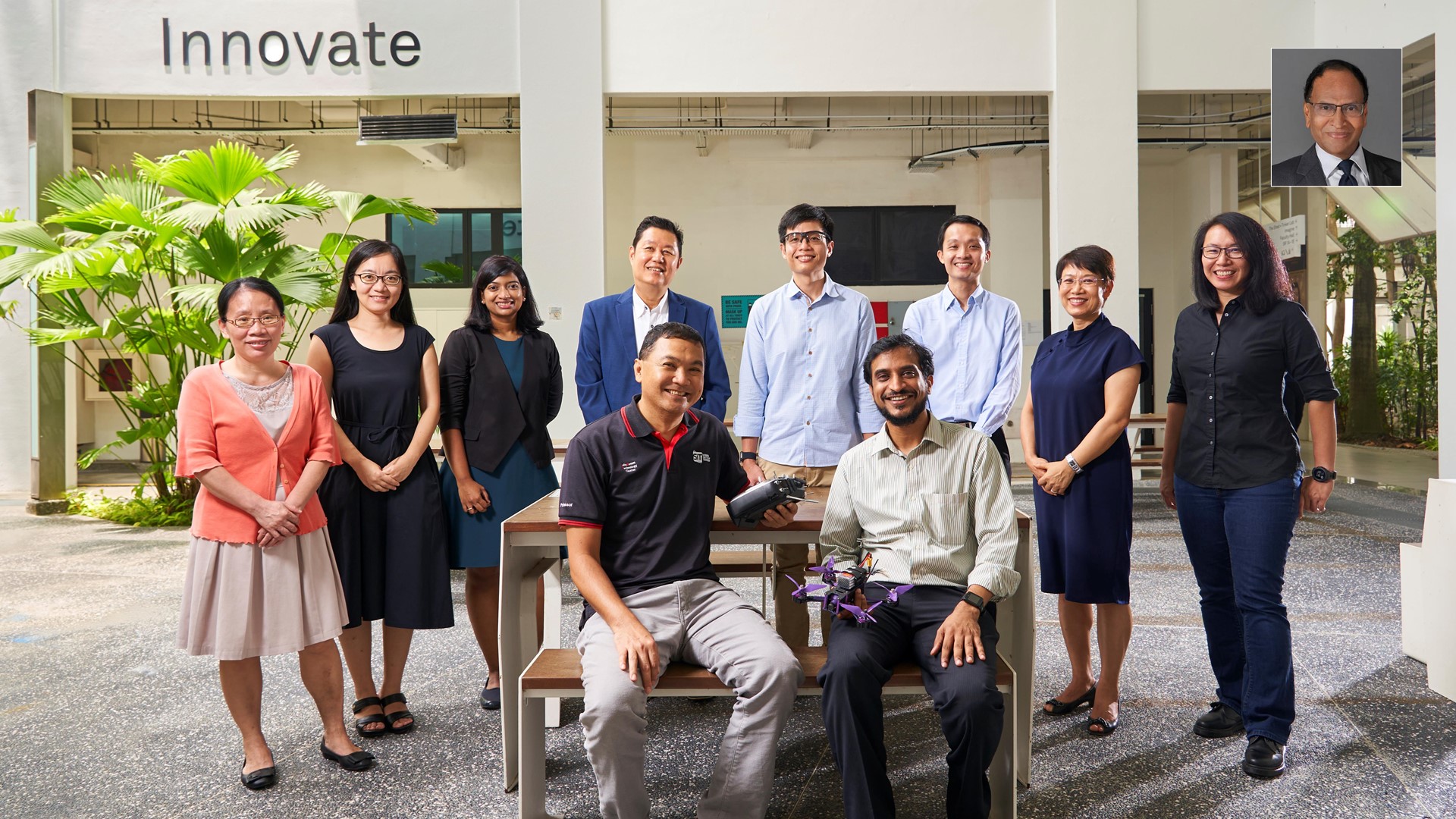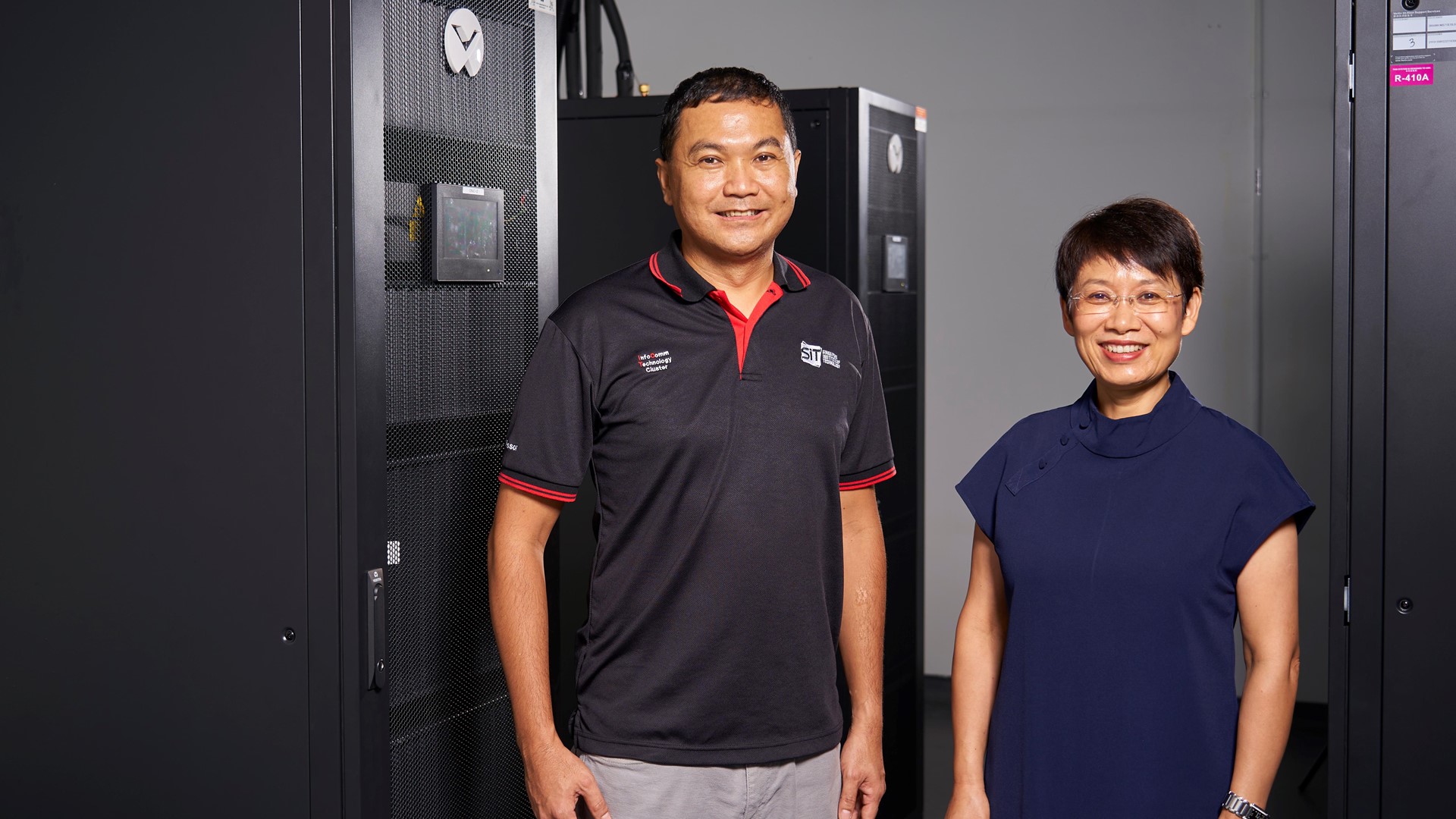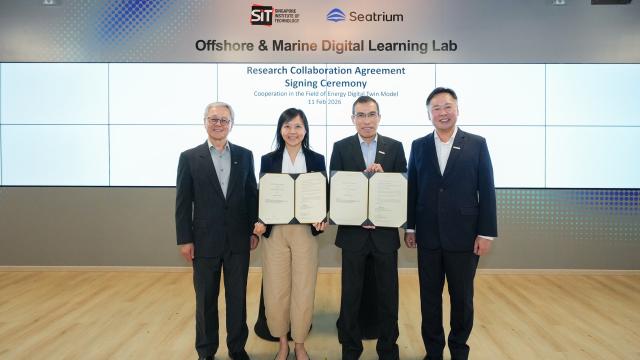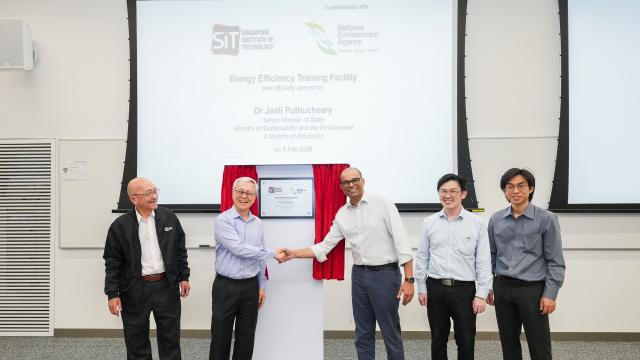The Future Communications Translation Lab (FCTLab) established at SIT will facilitate industry adoption of nascent technologies in 5G and future communications. It aims to enable open innovation, learning, testing and validating of technologies and use cases with various industries and agencies

The multi-disciplinary team at FCTLab comprises (standing, from left) Research Fellow Mo Ronghong, A/Prof Pei Yiyang, Asst Prof Purnima Murali Mohan, Prof Lim Boon Huat, A/Prof Tan Chek Tien, Jeff Aw, Prof Sun Sumei, A/Prof Jeannie Lee, (seated, from left) A/Prof Forest Tan, A/Prof Neelakantam Venkatarayalu, as well as (inset) A/Prof Benjamin Premkumar. (SIT Photo: Keng Photography/Tan Eng Keng)
It is another busy day at the port. The afternoon sun hangs high, beaming hot rays of light onto the towers of shipping containers occupying the port. Several container cranes start to pick the containers up, moving them around in a quick and precise medley.
These container cranes are simultaneously controlled by one operator, who is enjoying the comforting breeze in his study within his apartment, a long way from the port. This is what the future of Singapore’s workforce could look like with the power of 5G – the latest standard for wireless networks.
It is fast and allows for smoother connections, which can greatly benefit many aspects of modern life, from working remotely with ease to smoother play when gaming. Islandwide coverage of 5G is expected to kick in by 2025.
It could change a manpower-lean Singapore, said Professor Sun Sumei, Head of the Singapore Institute of Technology’s Future Communications Translation Lab (FCTLab). “With the implementation of 5G, remote work can be done more efficiently, and work environment and safety may be greatly improved,” she said.
When 4G Becomes 5G
SIT is at the heart of this transformation. The FCTLab facilitates the adoption of 5G technology in the industry and workforce. It bridges gaps and finds solutions that industry partners and agencies may face when implementing 5G connections. The R&D centre comes up with communications solutions and technologies.
It was started in mid-2021 as part of Singapore’s Future Communications Research & Development Programme (FCP).
“SIT is the ideal host of the FCTLab due to its reputation as Singapore’s university of applied learning, and its focus on applied research in Singapore,” explained Prof Sun.
The FCTLab, which is spearheaded in collaboration with Singapore’s Infocomm Media Development Authority (IMDA) and the National Research Foundation (NRF), focuses on a kaleidoscope of areas in 5G technology and applications, from robotics and automation to augmented/virtual reality.
It has dedicated facilities and services that encourage open innovation with other institutes of higher learning (IHLs), research institutes, the industry and public agencies.
It works closely with industry partners. For example, it recently launched a grant call for industry partners to collaborate with the implementation of a 5G test network infrastructure within the FCTLab and SIT campus.
“We want to hear pain points and feedback from industry partners, and collaborate closely and co-create solutions together,” shared Prof Sun.

Prof Sun Sumei (right) and A/Prof Forest Tan (left) spearhead the management of FCTLab and its projects as Head and Deputy Head respectively. (SIT Photo: Keng Photography/Tan Eng Keng)
Make it Real
One important aspect of this R&D process? Digitally simulating the performance of 5G connectivity in real-world settings. After gathering on-site data and translating it into modelling and simulation software connected to the 5G test network, different scenarios can be recreated to simulate the performance.
“Multiple areas of 5G applications, such as mobility and port applications, are spearheaded by Singapore,” said Prof Sun. “We are able to test if 5G can support the applications in such environments at the FCTLab by mimicking them digitally.”
“Testing will not be the end of the R&D process,” she added. “If we encounter problems in terms of 5G performance, we will work on enhancement features so that we can deliver the required performance to support the applications.”
With that said, the FCTLab will not only help industries, but also individuals. SIT hopes to train and develop 5G and digital transformation talent pools with the lab’s facilities and services.
For undergraduates, the FCTLab brings unique training opportunities and an immersive learning environment where they get to learn about and experiment with 5G technologies.
“We have students in degree programmes such as Computer Engineering who are studying relevant fields in 5G, intelligent transportation and port of the future applications,” said Prof Sun. “The FCTLab will facilitate better training for these students.”
“We are also offering Master’s degree programmes for post-graduates to develop deeper capabilities in 5G and future communications technologies.”
Going Beyond 5G
Going even further, SIT is also meticulously crafting training frameworks and upskilling programmes for those in the workforce who are looking to refresh or upgrade their 5G and future communications knowledge and skills.
The university is also looking beyond 5G and into the endless possibilities that future communications has to offer.
“At the FCTLab, we do not want to stop the journey at just 5G,” said Prof Sun. “We are aiming for continuous success beyond current technologies.”















![[FA] SIT One SITizen Alumni Initiative_Web banner_1244px x 688px.jpg](/openhouse2025/sit-teaching-and-learning-academy/openhouse/sit-teaching-and-learning-academy/centre-professional-communication/directory/sites/default/files/2024-12/%5BFA%5D%20%20SIT%20One%20SITizen%20Alumni%20Initiative_Web%20banner_1244px%20x%20688px.jpg)


